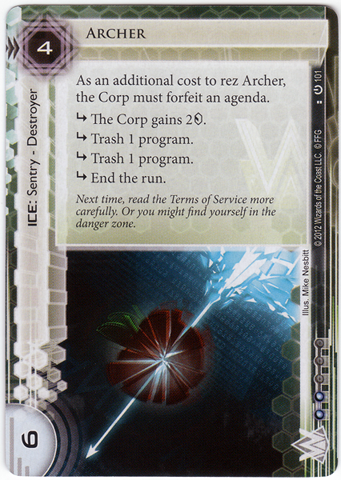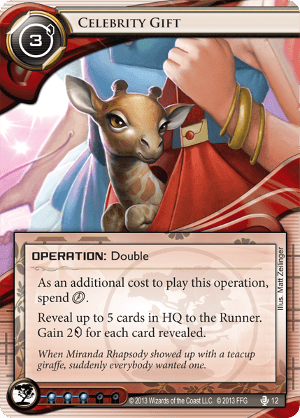I played my first game of Netrunner about two weeks ago and had almost a dozen games since, as I’ve quickly become born again as a Netrunner evangelist. This is a game that I’ve been meaning to get to the table for some time, and the main reason that I haven’t got it to the table before now is that it wasn’t on my shelf. I’ve never been into CCGs, LCGs or even ECGs before so I wanted to give it a test run before I dove in with the $50 base set and the inevitable expansions.
I knew a guy who knew a guy who had base set, and had agreed to both play a game with me and let me borrow the set*. I played the runner in the first game and what proceeded was a reasonably even game of give and take. I got some agendas but got cut by ice and ran straight into a Snare, and lost both my Magnum Opuses to the net damage. I was able to build myself up to make some decent runs on R&D, plowing through ice with my Battering Ram (plus a little bit of Tinkering), and giving myself enough linkage to mostly ignore his Hunter, making good use of my Shaper’s eye. I face-planted into a another snare but also took out most of his moneymakers without much hassle and ended up winning the game by just running where he didn’t have the credits to stop me.
Oh, wait. I forgot none of that makes sense. Netrunner’s a fun game but it’s a very much a gamer’s game perhaps even a game designer’s game. There’s jargon and terms that make it slightly difficult to explain the game to those who haven’t played, but creates a really engrossing in-game narrative. The art’s great and the flavour text is fantastic. I keep telling my friends about Archer, only for them to say they don’t really what the show, but a giraffe in a handbag can be appreciated by anyone.
(The flavour text on Archer reads: Next time read the terms of service more carefully. Or you might find yourself in the dangerzone.)
After my first game, I played again just a single game as the corp to teach a friend (and playtester) the ropes of the game. I couldn’t seem to get up and running and spent the entire game on the back foot, just getting hit. I lost without even scoring an agenda. I was a bit dissatisfied with how the starting corp deck worked and built a new deck for the rematch, which went down even worse (too much bet-hedging with a big kill card that I just couldn’t get off without another winning strategy, and not enough money or Ice). So, I’ve rebuilt the deck again, but it now needs a few more cards and the first data pack is looking awfully tempting. What I mean to say is, I’m caught in the Netrunner web.
What I’ve Taken Away
I don’t particularly believe in New Year’s Resolutions but I do believe in doing things. As I’m put more of my time and focus into game design, I’m also putting more time and focus into playing games. I believe being a more experienced player makes be a better player (and hopefully the other way around as well). I think Netrunner in particular has some object lessons about game design.
- Asymmetry is fun because it makes the game more of a shared experience. At the end of a game of poker, you don’t reveal your cards, as it’ll show your strategy, but in Netrunner you really want to talk about the game afterwards and go over what happened behind the cards. You want to tell your opponent (friend) what it felt like from the other side, and how they almost got you. Upon losing, it’s almost impossible not to pick up your deck and start going through the cards to see just how far away you were from victory.
- Factions (and deck-building) can help take the edge of competitiveness off the game as they encourage you to experiment. Each faction plays quite differently, which encourages players to try different styles of play, not just hone in on the most optimal deck. I also think the idea of designing and developing your own little corner of the game taps into something very primal among most gamers**.
- Complexity is a choice, and a contract. Netrunner players accept a certain level of complexity as they’re making a commitment to learn and replay the game. With this contract, the designer can get away with a lot more complexity than they would be able to with a game that was only going to hit the table once every couple of months.
- High concepts aren’t just for movies. Netrunner is very much a high concept game, and that’s what makes it so immersive. As a game designer, it’s hard not to focus on the particulars and mechanics and forget that sometimes players just want to be a cool hacker dude taking down a mega-corp (assuming your target audience is from the 90s)
- I already knew this, but it bear repeatings. Secrets are delicious.
If you’d like more of breakdown of what Netrunner is and how to jack in, just ask your friend, the internet (also, the internet may not be your friend and may be trying to kill you).
PS Leigh Alexander and Quinns (yes, he’s just one word now) wrote a rather compelling piece on Leigh’s rather personal experience with Netrunner on Shut Up and Sit Down that appeared just after I started playing. It gave me the feels.
* I’ve now got the base set and am waiting for the data pack to arrive
** When playing RPGs, I have a tendency to keep going back to the beginning and trying new characters. I’m a sucker for the promise of something new.


One thought on Running nets, taking names
Comments are closed.